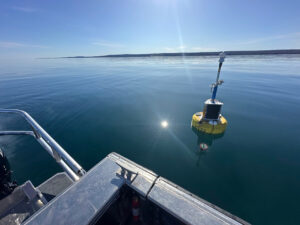YSI 6-Series Sonde Vented Field Cables
Features
- Sonde connectors have a built-in "key" to ensure proper field cable pin alignment
- For sondes with level sensors, vented field cables eliminate errors due to barometric pressure
- If you do not see your desired length, contact us for additional cable lengths and pricing
- Expedited repair and warranty service
- Lifetime technical support
- More
Overview
The YSI 6-series vented field cables are used to connect the 6-series sondes to the 650 display units. For sondes with level sensors, vented field cables are used to eliminate errors due to changes in barometric pressure.
Connection
For connecting the field cable to the sonde, the sonde connector has a built-in "key" to ensure proper pin alignment. Additionally, an integrated strain relief connector attaches to the sonde bail for added support during sampling and deployments. The other end of the field cable is a military-style 8-pin connector (MS-8). This MS-8 connector plugs directly into the 650 MDS display/logger. The 650 contains a microcomputer that allows it to be used in a similar manner to that of a terminal interface to a PC. Through the use of a YSI 6095B (MS-8 to DB-9) adapter, the sonde may be connected to a computer for setup, calibration, real-time measurement, and uploading files.
- Warranty: 2-years
In The News
Save our Bogs! Culture, Conservation and Climate Action in Ireland’s Peatlands
Characterized by long-term accumulation under waterlogged conditions, peatlands exist on every continent and account for 3-4% of the global land surface . Small but mighty, these often overlooked wetland environments are estimated to hold as much as one-third of the world's organic carbon in their soil—twice the amount found in the entirety of the Earth's forest biomass. While healthy peatlands can trap and store carbon, regulate water, and provide important habitats for rare species, human alteration has disturbed peatland carbon and nitrogen cycles on a global scale. Approximately 12% of the world’s peatlands have been drained and degraded through conversion for agriculture, forestry, infrastructure development, and other uses.
Read MoreSargassum Surge: How Seaweed is Transforming our Oceans and Coastal Ecosystems
Until recently, Sargassum –a free-floating seaweed–was distributed throughout the Sargasso Sea , the north Caribbean Sea, and the Gulf of Mexico. But in the space of a decade, this seaweed has, as one scientist remarks , “Gone from a nonfactor to the source of a terrible crisis.” Driven by climate change, anomalous North Atlantic Oscillation in 2009-2010 and a glut of anthropogenic pollutants, sargassum has proliferated. Seasonally recurrent mats as deep as 7m now bloom in the “Great Atlantic Sargassum Belt” (GASB), which covers areas of the Atlantic from West Africa to the Caribbean Sea and Gulf of Mexico. Every year, millions of tons wash up along the shores of more than 30 countries . Dr.
Read MoreGreat Lakes Research Center: Designing Targeted Monitoring Solutions
According to the National Oceanic and Atmospheric Administration ( NOAA ), the Great Lakes have more miles of coastline than the contiguous Atlantic and Pacific coasts combined and contain 20 percent of the world's freshwater, making it a critical region to protect and conserve. Continuous monitoring and data-informed resource management are key components of managing waters in the region. Hayden Henderson, a research engineer with the Great Lakes Research Center (GLRC), designs and deploys monitoring platforms throughout the Great Lakes. With a background in environmental engineering, Henderson enjoyed the challenge of creating systems and making them work to obtain difficult, remote measurements.
Read More














